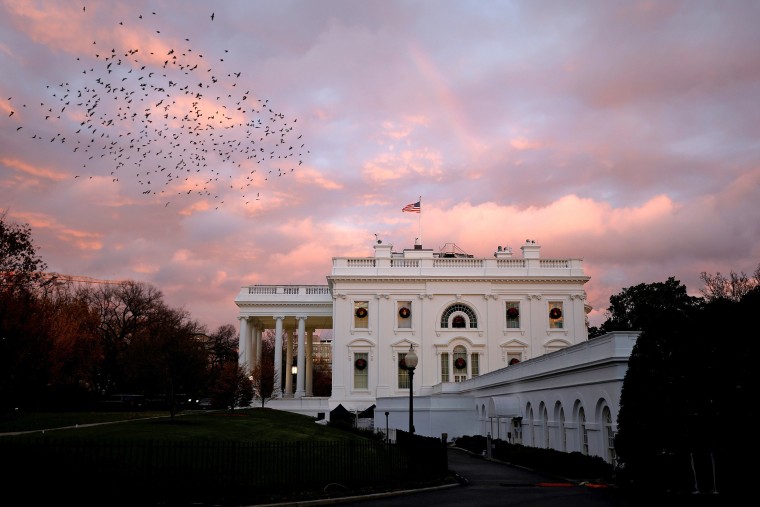When Congress passed an economic relief package last month, it was hardly a secret that it would not be the final word on the subject. As regular readers know, the $900 billion plan was designed to serve as a temporary lifeline for the winter months, with the expectation that the Biden administration would soon unveil proposals of its own.
A few days before Inauguration Day, President Joe Biden did exactly that, laying out the "American Rescue Plan": a $1.9 trillion relief package that would, among other things, finance a national vaccination program, provide emergency funding to state, local, and tribal governments, and invest heavily in direct aid to families and businesses.
The same plan included a minimum wage increase to $15 per hour, an increase in federal supplemental unemployment benefits, an eviction moratorium through September, rental aid, and a massive expansion of the Earned Income Tax Credit.
It was, by any fair measure, a big swing of the bat. If passed, the new president's American Rescue Plan would put the economy on strong footing, and provide considerable relief to families and communities that badly need it.
But passing such an ambitious proposal is much easier said than done. The Associated Press reported this morning on the opening steps of the White House's legislative efforts, which began in earnest yesterday with discussions between top presidential aides and a group of ostensible Senate moderates.
At least a dozen senators met for an hour and 15 minutes in a virtual call with White House National Economic Council director Brian Deese and other senior White House officials. Many hope to approve a relief package before former President Donald Trump's trial, which is set to begin in two weeks, overtakes Washington's attention.... White House coronavirus response coordinator Jeff Zients and White House legislative affairs director Louisa Terrell also joined the call.
Last week, a group of senators -- by some accounts, 16 lawmakers were involved -- started having discussions about scaling back Biden's proposal. The point of the endeavor, by all accounts, was and is to find some kind of bipartisan compromise.
Yesterday's meeting was the White House's way of not only defending the Biden plan, but making the case for an ambitious response to the ongoing crisis. The AP's report added, "The White House did not seem to budge on breaking up the package or reducing the overall price tag, even as it pushes for bipartisan support."
The limited options are clearly taking shape:
- Try to pass a bipartisan bill, which would necessarily require Democrats to make the package smaller and less effective.
- Try to pass an ambitious bill using the budget reconciliation process, which would require zero Republican votes.
All of which suggests the White House can have a bipartisan bill or a good bill. Checking both boxes at the same time does not appear to be an option. (Indeed, even if Team Biden were to dramatically slash the relief package's price tag, it's not clear if there are 10 Republican votes for any new economic measure.)
Looming large are the lessons from 2009. As E.J. Dionne noted in his new column:
So, as Biden would say, here's the deal: He and his party should indeed make every effort to negotiate with Republicans to win what support they can get. Bipartisanship is great when it works, so it's constructive that Brian Deese, the head of the White House's National Economic Council, is meeting with moderates and moderate conservatives, including Collins and Romney, to try to find common ground. What Democrats can't afford, Sen. Chris Van Hollen (D-Md.) said in an interview, is the "long drawn-out process" that characterized the party's approach during the early Obama years on both economic stimulus and health care.
To be sure, the Recovery Act rescued the economy from the Great Recession. But to pass it, Democrats were forced to make it smaller and less effective -- which was the price of persuading Sen. Susan Collins (R-Maine) and a small handful of other Republican "moderates." The result was a slower economy recovery and a frustrated public, which punished Democrats in the 2010 midterms.
Twelve years later, a new Democratic president has inherited another economic crisis from a failed Republican president, and the White House is eager to rescue Americans with another ambitious proposal. Susan Collins is once again demanding a narrower, smaller, and less effective response to the economic conditions -- creating a sense of deja vu all over again.
Postscript: If Democrats pursued the reconciliation route -- which is to say, ignoring Republicans and trying to pass a robust package on their own -- it would require the support of some skeptical senators, including Sens. Joe Manchin (D-W.Va.) and Angus King (I-Maine).
I mention this because there's no reason to assume the go-it-alone approach would necessarily produce a worthwhile proposal. This approach would still be a heavy lift.
